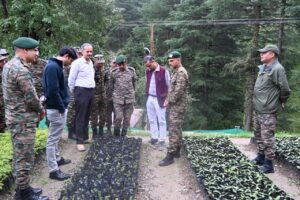 A workshop on landslide and flash flood management was jointly organized by the Himalayan Forest Research Institute (HFRI) and the Eco Task Force at the Kufri Army Camp, Shimla. The one-day training and capacity-building programme focused on enhancing environmental resilience in Himachal Pradesh’s vulnerable Himalayan regions, with over 50 Eco Task Force personnel in attendance. Emphasis was placed on sustainable afforestation practices, such as the use of mycorrhizal fungi in nurseries to improve water and nutrient uptake in plants—especially vital for vegetation on steep southern slopes where survival rates are typically low.
A workshop on landslide and flash flood management was jointly organized by the Himalayan Forest Research Institute (HFRI) and the Eco Task Force at the Kufri Army Camp, Shimla. The one-day training and capacity-building programme focused on enhancing environmental resilience in Himachal Pradesh’s vulnerable Himalayan regions, with over 50 Eco Task Force personnel in attendance. Emphasis was placed on sustainable afforestation practices, such as the use of mycorrhizal fungi in nurseries to improve water and nutrient uptake in plants—especially vital for vegetation on steep southern slopes where survival rates are typically low.
Commanding Officer of the 133 Eco Task Force, Col. Deepak Kumar, highlighted the need for high-density, species-diverse plantations to stabilize soil in landslide-prone areas. HFRI scientists also visited the Eco Task Force nursery at Battalion Headquarters, Kufri, to offer hands-on guidance. Dr. Ashwani Tapwal discussed the benefits of mycorrhizal fungi, while Dr. Pravin Rawat emphasized the importance of fodder fencing to prevent grazing and forest fires. HFRI Director Dr. Sandeep Sharma underlined the role of integrated plant management and bioremediation in ensuring long-term ecological stability.
During the workshop, Eco Task Force personnel pledged to adopt best environmental practices, reduce their carbon footprint, promote biodiversity, and actively involve local communities in conservation efforts. The initiative is expected to positively impact more than 100 hectares of degraded land in the region.



